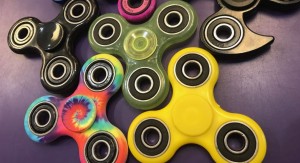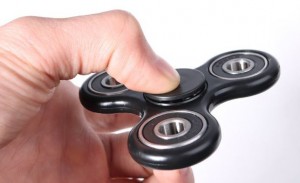Classroom ban on fidget spinners: Amaze responds
Posted on
Catherine Hettinger, a chemical engineer from Florida, must be bemoaning the fact that the fidget spinner craze didn’t begin 20 years ago.
Hettinger had created the toy, which sells from between $2 to $90, when she saw young boys throwing rocks at police officers in Israel. She wanted to find a way to distract children and give them something soothing to release pent-up energy.
Sara Hettinger, the inventor’s daughter, told Inside Edition that after struggling for years to get someone to make her toy, Catherine struck money problems and couldn’t afford the $400 fee to renew her patent and was forced to let it expire.
Now anyone can make fidget spinners and they don’t have pay Hettinger a cent.
The craze is so great that thousands of schools across the US have banned them and some in Melbourne, including Mazenod College, are doing the same because they are supposedly distracting students
Amaze CEO Fiona Sharkie, in an interview on ABC radio’s Afternoons with Clare Bowditch, made the following points about fidget toys.
Fidget toys and those on the autism spectrum
“We can say for decades that many autistic people have been using fidget toys as part of their everyday life and they can be all kinds of things.
“And not just autistic children, but autistic adults use all kinds of toys and devices. It can be squishy stress balls, plastisine, silly putty, things that are really tactile and nice to squeeze”.
What are the benefits of fidget toys?
“The main point I want to make is that what autistic people use these for is when they are overwhelmed in environments they really help to stabilise their anxiety and help them focus.
“There’s also been something written by an autistic man who said, ‘While I’m talking to you there are about 10 different things going on in my head because that’s the way my brain works’. So having a fidget toy or something can help to focus on the one thing rather than 10. This is something really beneficial.
“We have a terrific woman in our community, Prue Stevenson, who is a fine artist and her hands are moving all the time. She knits and has done phenomenal artworks of knitting because it keeps her hands busy and that helps her to regulate her emotions.
“Whether it’s a fidget spinner or a piece of plastisine, these things are very beneficial to autistic people”.
Is there a concern about banning fidget toys in schools?
“Every person on the autism spectrum is different which means every device they use to regulate their emotions could be different. For some kids the fidget spinner might be critical to them.
“Equally, it could be some other (device). The main point I want to make is that if an autistic student does need something to fidget with then they should be listened to and adjustments in the classroom should be made to do that. It’s about that child and what works for them.”
Amaze Facebook response: Comments from followers
“My daughter is autistic and has anxiety disorder as do l and the noise of the ball bearings would impact on her hypersensitivity to noise. This is a FAD and it’s been marketed as an Autism, ADD, ADHD , Sensory toy – Buyer Beware”.
“For just an $8 investment, we have found it to be a positive distraction for my autistic/ADHD/ODD son. Whatever works and each child is individual, so worth a try…”
“In the classroom, they are just a distraction. Kids are better off playing with their shoelaces”.
“This is one of the first things except a baby rattle that my asd child has gotten a benefit from. It’s the actual spinning action he finds calming”.
“Helps my boys with ASD to reduce anxiety so I’m happy with that – better than screen time!!!”
“Great for those who really need them (ASD/ADHD) but most of the kids at my school who have them, don’t need them. They are distracting”.
“This toy ring came out and got stuck on my little one’s index finger and I had to go to the hospital to get it out . Not very amused . I guess it has to be very high quality and not come out”
* Anyone (teacher) who refuses a child on the spectrum a sensory toy /aid needs a little update.
Guess what. We can have individual rules for individuals. Used appropriately the sensory toys are an asset for those on the spectrum”.
* My asd son has one and loves it, his teacher has ordered some for their classroom too. I think they are great for the people that actually need something sensory”.


